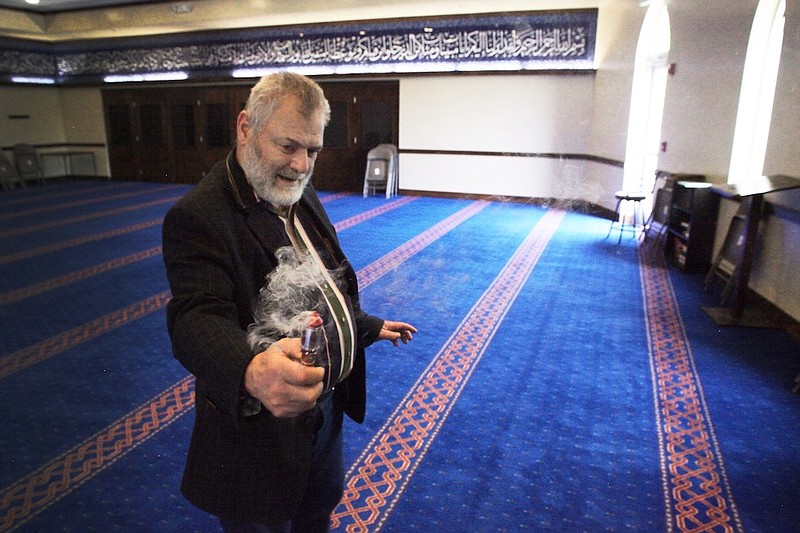Sadek Alsouqi walks the empty hallways of the mosque on a Wednesday afternoon. The classrooms around him are empty. The bins to store shoes before entering the prayer room are empty, too.
Alsouqi steps onto the blue carpet and begins spreading incense smoke throughout the room. The odor fills the empty space on what should be the eve of a joyous time.
But for more than a month, the ongoing coronavirus pandemic has kept Muslims in Chattanooga from gathering for weekly prayers. The virus closed Annoor Academy, the local Islamic school. And now it is affecting the centuries-long traditions in the holy month of Ramadan.
The practices of fasting and praying will continue but the social aspects of the tradition are being forced to move from community centers to individual homes because of concerns over COVID-19.
The weekend iftars, the community dinner parties to break fast, and the taraweeh - the community prayer in the evening that involves reciting the entire Quran over the month - will not be held at the Islamic Society of Greater Chattanooga this year. Even Eid al-Fitr, the gathering in late May to celebrate the end of the holy month, may not be allowed.
Dr. Arif Shafi, a society board member, said this is a tough time for local Muslims as they begin observing Ramadan Thursday evening.
"It's going to be totally interesting," Shafi said. "Members are not happy, of course. They are concerned. But we have to do what we have to do."
Earlier this week there was some hope in-person gatherings would return as Tennessee Gov. Bill Lee announced plans to re-open the state during the pandemic. However, the mixed messages coming from state, county and city officials had leaders of the mosque feeling uncertain, Shafi said. For now, they will follow Chattanooga Mayor Andy Berke's directives to remain at home, he said.
Muslims must respect the laws of the place they are living, which include stay-home orders, Alsouqi said. The taraweeh and other prayers can be done at home without losing any spiritual value, he said.
"Even in Ramadan, or not Ramadan, the key is the intention," Alsouqi said.
In previous years, the Islamic Society would be full on weekends with more than 200 people coming for community dinners. The assemblies helped people support one another during the month-long fast, Shafi said.
People across the region are feeling the ongoing toll of isolation caused by the pandemic. In other years, the month of Ramadan is a joyful time and something Muslims anticipate, said Bassam Issa, who helped found the Islamic school.
"The happiness of getting this month that we wait for every year and that we're anxious about, it's a disappointment," he said.
Ramadan is a time of increased focus on charity for Muslims, as the religion says prayers and acts of giving are rewarded more generously during the holy month. Typically, the Islamic Society used the month to help raise funds for the school's upcoming year to support the 80 children who are enrolled and the teaching staff, Issa said.
Houses of worship across Chattanooga are concerned about their futures as the economic impacts of the coronavirus continue to mount. More than 10% of Chattanooga's workforce is currently unemployed because of the virus.
"People are going to be more reserved, I would imagine, in what they would give because they don't know what's coming up," Issa said. "They could get sick or lose their jobs. It's definitely not business as usual."
The Islamic Society got a trial run in its new online donation platform after an EF3 tornado hit Chattanooga nearly two weeks ago. The organization raised more than $9,000 to help those affected by the storm, which included more than a dozen Muslim families who had their homes partially or fully destroyed. The families are now staying in a hotel or with friends and family in Chattanooga, Issa said.
Through the multiple struggles Chattanooga is facing - the public health crisis, economic recession and natural disaster - people are staying hopeful God will provide, Issa said, even if the celebration of faith will look different in the weeks to come.
Faiz Sheikh, a freshman at the University of Tennessee at Chattanooga, said the school's shutdown gave him more time to focus on his faith. In previous Ramadans, the 20-year-old would be balancing school and work on top of his religious obligations. The stay-home orders affecting the holy month make him both sad and excited, he said.
"By social distancing and everything being closed, I feel like I have a chance to get closer to God right now, and I think that the faith would be stronger," Sheikh said.
Instead of relying on the faith community at the mosque for support, this Ramadan will require building that faith community at home, he said.
Contact Wyatt Massey at wmassey@timesfreepress.com or 423-757-6249. Follow him on Twitter @news4mass.
